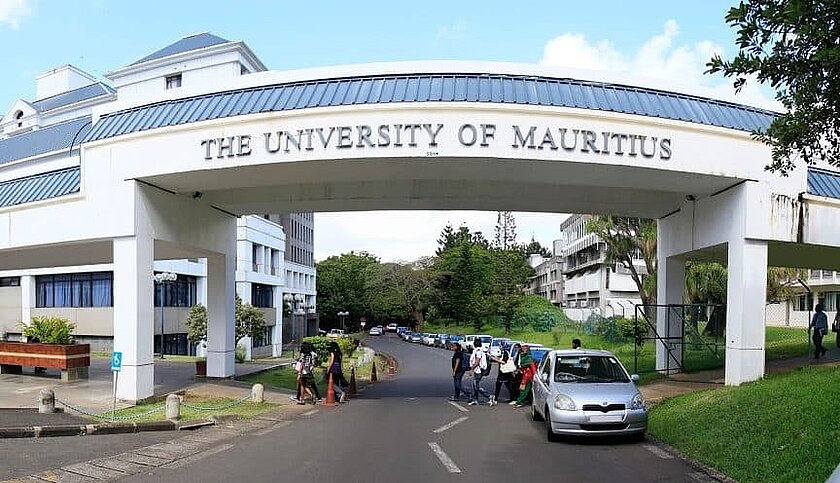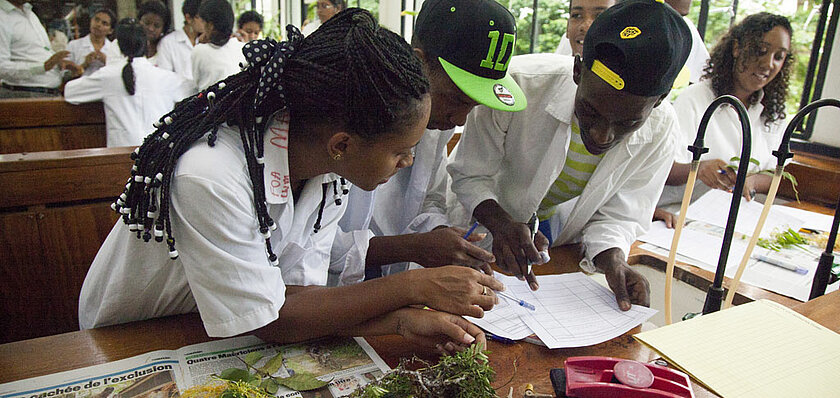The first part of the project is already in the starting blocks: Starting in autumn 2022, the master's programme "Intelligent Information Management" will bring (agro-)entrepreneurs closer to the technological knowledge that can be used to advance the agri-food sector in Mauritius in the future. We talked to project leader Prof. Dr. Heiko Gewald (opens in a new window) and Axel Hund (opens in a new window) from the Center for Research on Service Siences (CROSS) (opens in a new window) at HNU about how the project with the Mauritian partner university came about, what expertise the HNU researchers are contributing and how the jointly designed new master's programme on the island can make a lasting contribution to sustainable food security.

University of Mauritius
The University of Mauritius (UoM), the oldest and largest university in the island nation, evolved from the School of Agriculture established in 1914 and was officially founded in 1965. At today's Faculty of Agriculture, solutions to the ever-growing challenges in the local agricultural sector are developed in the two departments of Agricultural & Food Science and Agricultural Production & Systems.
[1]
Food supply on Mauritius: "One must not be blinded by the luxury hotels".
Snow-white beaches and turquoise waters: Mauritius is generally regarded as the epitome of a holiday paradise. But that is only one side of the 2,000 square kilometre island state in the Indian Ocean - behind the lagoons and honeymoon suites, one encounters the reality of a republic that, although it is one of the wealthiest countries on the African continent and has transformed itself from a developing to an emerging country in recent years, is currently facing serious challenges. "One should not be blinded by the luxury hotels," says Prof. Dr. Heiko Gewald, who got to know the island during several research stays. "The living conditions are partly precarious". Another cause for concern are recurring bottlenecks in the food supply: Due to its geographical location, Mauritius has to import the majority - a good 70 per cent - of the food it needs. COVID19 has put a further strain on the already problematic supply chain, causing serious shortages and breakdowns in basic food supplies. To make matters worse, the island nation has only a limited overview of its actual import needs. "Data analytics or forecasting is hardly used," explains the research professor. "This offers a lot of room for optimisation in terms of information management.
[2]
Technological progress: The course must be set now
Mauritius must and wants to use the new technological opportunities - and the course for this must be set now. This is where the INFINITY project comes in, which has been jointly run by HNU and UoM (University of Mauritius) since June 2021. The universities, which are almost 9,000 kilometres apart as the crow flies, have had a close research relationship for many years with major overlaps in their scientific knowledge interests - and so the project funding announced jointly by the BMBF and DAAD last year came at just the right time thematically: it ties in with the BMBF's Africa strategy and aims in particular to promote young scientists, employability and research cooperation to strengthen the UN's Sustainable Development GoalsInfobox. Thus, the double-funded INFINITY project now combines two different but interlinked parts under the common umbrella of improved food supply: The DAAD-funded "Education and Training" module serves to implement a new degree programme for sustainable knowledge transfer; the BMBF-funded research part is dedicated to the use of Big Data and AI in regional food production. The knowledge gained from this should enable Mauritian actors to use digital innovations to provide the population with a better and safer supply of regionally produced food.
Sustainable Development Goals
The Sustainable Development Goals (German abbreviation: Agenda 2030) adopted by the United Nations in 2016 serve global sustainable development in economic, ecological and social responsibility; food security is one of the topics of the goal.
Food Security
is based on the four fundamental pillars of availability, access, utilisation and stability. In terms of development policy, it is given when people have access at all times to the food they need for an active and healthy life (World Bank/EU definition).
[3]
"Intelligent Information Management" for Agro-Entrepreneurs and Managers
Work is already in full swing on the first sub-area, which is to lead to a sustainable build-up of local know-how: Axel Hund and his colleagues at the UoM are currently working out the curriculum of the part-time course: "In Mauritius, it is common practice to complete the Master's course part-time - which is of course also due to the fact that people have to earn a living at the same time; hardly anyone can afford a full-time Master's course. The aim is to train interested people with previous knowledge in the agricultural sector in depth in the direction of computer science and information management - starting with the basics ("What is an information system, what is a database?") to more advanced topics such as BlockchainInfobox, data analytics and artificial intelligence (AI). To this end, the Mauritian-German research team had already conducted a comprehensive status quo analysis and used surveys and workshops to find out exactly what the needs of local companies are and which gaps in local knowledge need to be filled.
[4]
The HNU as a constructive sparring partner
The HNU scientists contributed their experience in the conception and implementation of new degree programmes and supported the UoM, among other things, in the definition and identification of their target group. By means of personas, the future students could be contoured: People who are already in professional life and can recognise and use the benefits of innovative technologies for their work. The target group thus includes different stakeholders in the Mauritian food chain - small agro-entrepreneurs as well as managers of the largest Mauritian agribusiness companies. This naturally means that very different requirements and needs have to be taken into account within a single course of study, explains Axel Hund. In some places, it is first a matter of integrating office applications into the process, for example to manage stocks efficiently; larger companies, on the other hand, may already have AI applications in mind. "That was the big challenge in the conception of this degree programme: on the one hand, we have to pick people up at the right point, but on the other hand, we also have to introduce them to the subject matter in such depth that we enable a long-term gain for all stakeholder groups."
Blockchain
refers to a decentralised, cloud-based database whose entries, combined in blocks, can be transmitted in a tamper-proof manner. Blockchain technology enables a simpler, more secure and faster exchange of information and can thus provide more transparency within a supply chain, among other things.

[5]
Overarching goal: structural changes for more sustainability
Long-term success is of central importance in both parts of the project: "The new degree programme should also address the relevant needs in five or ten years' time and enable its graduates to come up with solutions that sustainably improve the food supply in Mauritius," explains Prof. Dr. Heiko Gewald. In the coming months, the BMBF-funded part of the project will also be advanced, which will research innovative technologies tailored to the local conditions in Mauritius. So anyone who wants to know more about the role AI and blockchain play in this should stay tuned: The HNU science blog will continue to follow INFINITY and report back here.

Axel Hund
is research assistant for the research area "Use of Innovative Technologies in Emerging Markets". Prior to his doctoral project, he completed a Master's degree in International Business Administration.
When I'm not researching / working, I...
... I like to spend time with friends and family, cook or do sports. The latter preferably outdoors in nature.
Current reading:
Enlightenment Now: The Case for Reason, Science, Humanism, and Progress by Steven Pinker.
My field of expertise in three words:
Digital Innovation Management
My next publication / research project will be ...
... explore how innovative digital technologies can be used to achieve various sustainability goals, e.g. food security.
Working scientifically / doing a PhD is ...
... very different depending on the discipline. In business informatics, it is the opportunity to delve deeply into relevant technology-related issues in order to develop new solutions to problems.






